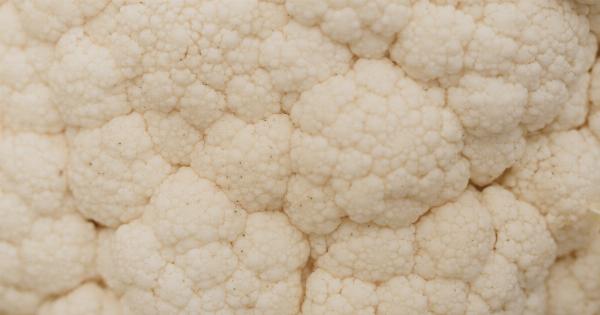Cauliflower is a member of the cruciferous vegetable family, which also includes broccoli, kale, and cabbage. It is a vegetable that is both tasty and nutritious, and it has numerous health benefits.
Here are some of the health benefits and nutritional value of cauliflower:.
1. Rich in Nutrients
Cauliflower is an excellent source of nutrients like vitamin C, vitamin K, vitamin B6, folate, and potassium. It also contains small amounts of other micronutrients like calcium, magnesium, iron, and zinc. One cup of cooked cauliflower provides:.
- Calories: 28
- Protein: 2 grams
- Fat: 0.3 grams
- Carbohydrates: 5 grams
- Fiber: 2 grams
2. Helps with Weight Loss
Cauliflower is low in calories and carbohydrates, making it an excellent choice for weight loss diets. One cup of cooked cauliflower contains only 28 calories, which is much lower than other vegetables like potatoes or corn.
The fiber in cauliflower also helps you feel full, which can prevent overeating and help you maintain a healthy weight.
3. Contains Antioxidants
Cauliflower is a rich source of antioxidants, which can help prevent damage to your cells caused by harmful molecules called free radicals.
Antioxidants protect your cells against oxidative stress, which is a key factor in aging and the development of many chronic diseases. Some of the antioxidants found in cauliflower include beta-carotene, quercetin, and kaempferol.
4. May Reduce the Risk of Cancer
The antioxidants in cauliflower may also help protect against cancer. Some studies have shown that cruciferous vegetables like cauliflower may reduce the risk of several types of cancer, including lung, breast, and prostate cancer.
The compounds in cauliflower may help inhibit the growth of cancer cells and prevent the formation of new ones.
5. Good for Digestive Health
Cauliflower is a great source of dietary fiber, which is essential for digestive health. Fiber helps regulate bowel movements, prevent constipation, and promote the growth of healthy gut bacteria.
The fiber in cauliflower also helps reduce inflammation in the gut and can help reduce the risk of conditions like inflammatory bowel disease and colon cancer.
6. May Improve Brain Function
Cauliflower is an excellent source of choline, a nutrient that is essential for brain health. Choline is involved in many important processes in the brain, including the development and maintenance of memory.
Studies have shown that diets high in choline are associated with better cognitive function and a reduced risk of neurological disorders like dementia and Alzheimer’s disease.
7. Supports Heart Health
Cauliflower is rich in nutrients like potassium, folate, and fiber, which are important for heart health.
Potassium is essential for maintaining healthy blood pressure, while folate helps reduce the risk of heart disease by reducing levels of a compound called homocysteine. The fiber in cauliflower also helps lower cholesterol levels, which can reduce the risk of heart disease.
8. Versatile in Cooking
Cauliflower is a versatile vegetable that can be used in a variety of dishes. It can be roasted, grilled, mashed, boiled, or steamed, and it can be added to soups, stews, salads, and casseroles.
It can also be used as a low-carbohydrate alternative to grains and legumes in recipes like cauliflower rice or cauliflower pizza crust.
9. Low in Carbohydrates
Cauliflower is very low in carbohydrates, making it an excellent choice for low-carbohydrate diets like the ketogenic diet. One cup of cooked cauliflower contains just 5 grams of carbohydrates, 2 of which are fiber.
This makes cauliflower an ideal vegetable for people who are trying to reduce their carbohydrate intake.
10. Easy to Find and Affordable
Cauliflower is widely available in supermarkets and grocery stores, and it is usually affordable. It is also easy to grow at home if you have a garden, making it a convenient and inexpensive source of healthy nutrition.




























